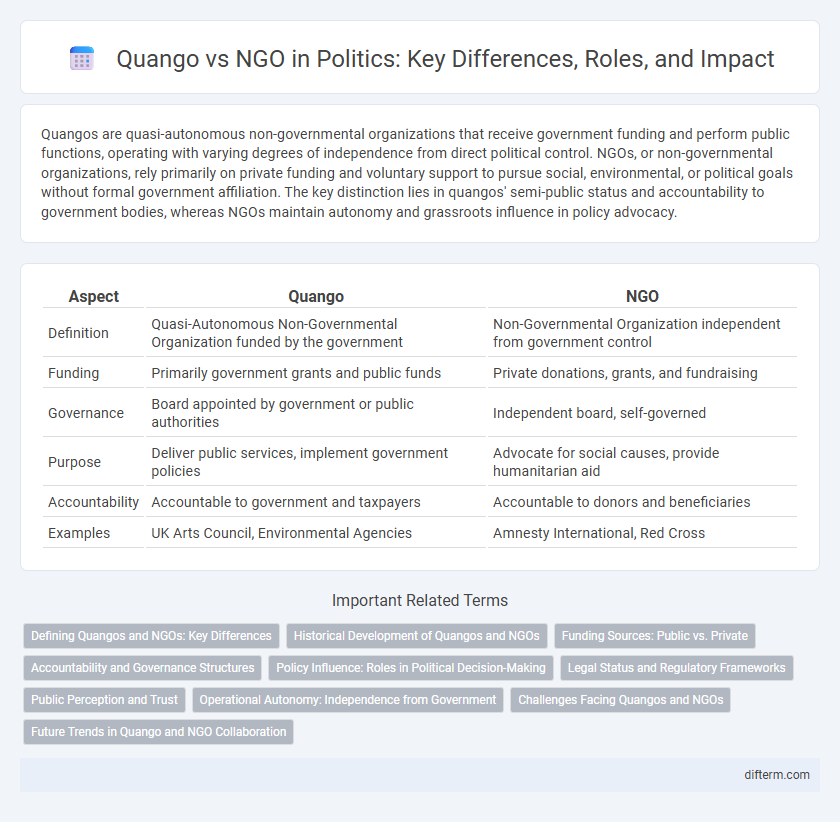Quangos are quasi-autonomous non-governmental organizations that receive government funding and perform public functions, operating with varying degrees of independence from direct political control. NGOs, or non-governmental organizations, rely primarily on private funding and voluntary support to pursue social, environmental, or political goals without formal government affiliation. The key distinction lies in quangos' semi-public status and accountability to government bodies, whereas NGOs maintain autonomy and grassroots influence in policy advocacy.
Table of Comparison
| Aspect | Quango | NGO |
|---|---|---|
| Definition | Quasi-Autonomous Non-Governmental Organization funded by the government | Non-Governmental Organization independent from government control |
| Funding | Primarily government grants and public funds | Private donations, grants, and fundraising |
| Governance | Board appointed by government or public authorities | Independent board, self-governed |
| Purpose | Deliver public services, implement government policies | Advocate for social causes, provide humanitarian aid |
| Accountability | Accountable to government and taxpayers | Accountable to donors and beneficiaries |
| Examples | UK Arts Council, Environmental Agencies | Amnesty International, Red Cross |
Defining Quangos and NGOs: Key Differences
Quangos, or quasi-autonomous non-governmental organizations, are bodies funded by the government but operate with partial independence, often implementing public policies. NGOs, or non-governmental organizations, function independently from government control, relying primarily on private funding to address social, environmental, or political issues. The key difference lies in their governance and funding sources, with Quangos bridging government oversight and NGOs emphasizing autonomy and civil society engagement.
Historical Development of Quangos and NGOs
Quangos emerged primarily in the United Kingdom during the mid-20th century as semi-autonomous government bodies designed to execute specific public functions while maintaining operational independence. NGOs have a longer history, with roots tracing back to 19th-century charitable and missionary organizations that later expanded into diverse advocacy and humanitarian roles worldwide. The evolution of quangos reflects government efforts to decentralize administration, whereas NGOs developed organically as independent civil society actors influencing policy from outside formal political structures.
Funding Sources: Public vs. Private
Quangos primarily receive funding from public sources, such as government budgets and taxpayer money, allowing them to operate with official mandates and regulatory powers. NGOs rely heavily on private funding, including donations, grants from foundations, and corporate sponsorships, which provide greater independence but can create challenges in financial stability. The contrasting funding sources highlight the differing accountability structures and operational freedoms between quangos and NGOs in political environments.
Accountability and Governance Structures
Quangos operate as semi-autonomous government bodies with accountability primarily to governmental authorities, embedding them within formal governance frameworks and subject to public sector oversight mechanisms. NGOs maintain independent governance structures, accountable mainly to their boards, donors, and beneficiaries, which can result in greater flexibility but variable transparency standards. The contrasting accountability models of Quangos and NGOs significantly influence their governance effectiveness, regulatory compliance, and public trust levels.
Policy Influence: Roles in Political Decision-Making
Quangos (Quasi-Autonomous Non-Governmental Organizations) directly influence political decision-making through government-appointed board members who implement public policies and advise on regulatory frameworks. NGOs (Non-Governmental Organizations) exert policy influence by mobilizing public opinion, conducting advocacy campaigns, and engaging in grassroots lobbying to shape legislative agendas. Both entities play critical yet distinct roles in the political ecosystem, with quangos facilitating formal policy formulation and NGOs driving agenda-setting from civil society.
Legal Status and Regulatory Frameworks
Quangos operate under statutory authority, established by government legislation, granting them formal legal status with defined regulatory frameworks and accountability to public bodies. NGOs, in contrast, are independent non-profit organizations governed by civil law, often registered as charities or societies, with regulatory oversight varying by jurisdiction but lacking direct government control. The distinction in legal status impacts their operational transparency, funding mechanisms, and policy influence within political systems.
Public Perception and Trust
Quangos (quasi-autonomous non-governmental organizations) often face public skepticism due to perceived government influence and lack of transparency, which can erode trust compared to NGOs. NGOs are typically viewed as independent, grassroots entities championing civil society interests, leading to higher public credibility and engagement. Trust in NGOs is further reinforced by their transparency practices and community-driven initiatives, contrasting with quangos' bureaucratic image.
Operational Autonomy: Independence from Government
Quangos maintain limited operational autonomy due to government oversight and funding, often requiring adherence to governmental policies and mandates. NGOs typically exhibit greater independence, operating without direct government control, allowing for flexible decision-making aligned with their mission. This distinction in governance structures significantly impacts how each entity pursues objectives and interacts with political frameworks.
Challenges Facing Quangos and NGOs
Quangos face challenges such as limited accountability, bureaucratic inefficiencies, and dependency on government funding that can influence their independence. NGOs often struggle with resource constraints, donor reliance, and navigating complex political environments that affect their advocacy effectiveness. Both entities must address transparency and governance issues to maintain public trust and fulfill their missions effectively.
Future Trends in Quango and NGO Collaboration
Quangos and NGOs are increasingly exploring collaborative efforts to leverage governmental influence and grassroots expertise for effective policy implementation. Advancements in digital platforms and data sharing are enhancing transparency and accountability, fostering stronger partnerships between these entities. Future trends indicate a growing emphasis on co-created solutions that address complex social challenges through combined resources and innovation.
Quango vs NGO Infographic

 difterm.com
difterm.com